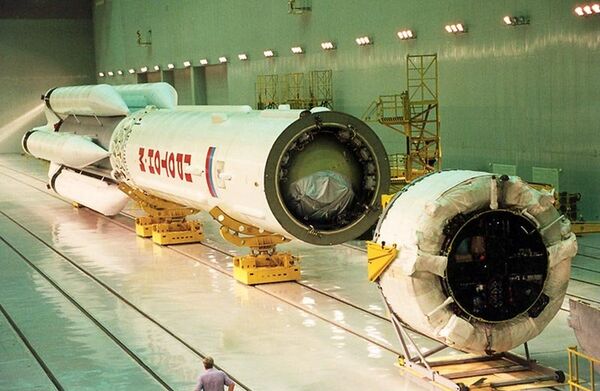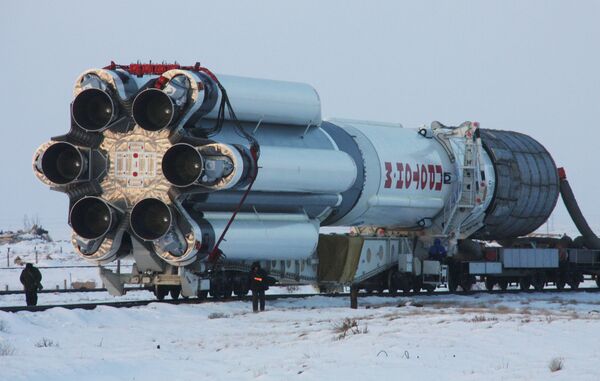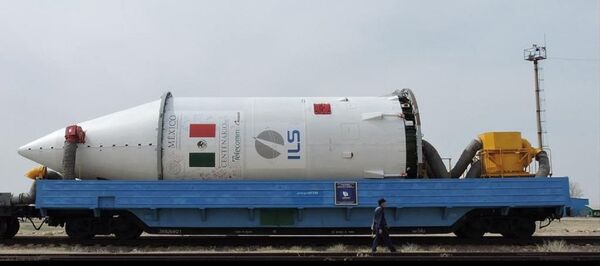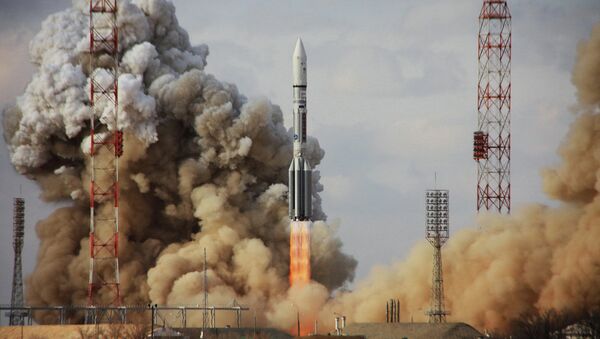Russia’s Space Agency Roscosmos has confirmed that the launch of the Russian Proton-M rocket went wrong when its telemetry jammed. The rocket and its payload, a Mexican communication satellite, burned up in the atmosphere.
О ситуации с ракетой-носителем «Протон-М»: http://t.co/3HjcYgT4Qj pic.twitter.com/lSD2zq2ma7
— РОСКОСМОС (@fka_roscosmos) 16 мая 2015
“The failure happened on the 497th second of the flight, at an altitude of 161 kilometers. The third stage, the booster vehicle and the spacecraft almost completely burned up in the atmosphere. As of now there are no reports of debris reaching the ground,” the agency said in a statement on its website.
The agency added that the satellite and its launch were insured. Third party liability has been insured by the Russian side.
Earlier reports suggested that the third stage and the satellite fell to Earth over Eastern Siberia.
“Preliminary data indicate that the third stage and the Mexican satellite fell in the Chita region [of Russia]. The emergencies ministry has been notified,” Russian media quoted a source in space industry as saying.
Local authorities however said there were no reports in the Chita region of either any rocket debris falling anywhere near towns, or otherwise casualties.
На Байконуре состоялся вывоз РН «Протон-М» с КА «МекСат-1» на стартовый комплекс, пуск намечен на 16 мая в 8:47 мск pic.twitter.com/EjJda4wHFQ
— РОСКОСМОС (@fka_roscosmos) 14 мая 2015
Hazardous propellant from the failed launch vehicle may have leaked into the atmosphere.
“The toxic heptyl propellant used in propulsion systems of all three rocket stages and Briz-M upper stage might have leaked into the atmosphere or exploded at the possible crash site of the third stage and the Mexican satellite in Chita region,” another source suggested.
Прямая трансляция пуска РН «Протон-М» с КА «МекСат-1»: http://t.co/he0lQTzi1e Готовность к пуску 1 час pic.twitter.com/CM0oTcNNWw
— РОСКОСМОС (@fka_roscosmos) 16 мая 2015
The height at which the third stage of Proton-M with detached Mexican satellite fell from is 160 kilometers, meaning that the wreckage should have been burnt in atmosphere.
Готовность к пуску ракеты-носителя «Протон-М» 30 минут, прямая трансляция: http://t.co/he0lQTzi1e pic.twitter.com/VboXJt3M0P
— РОСКОСМОС (@fka_roscosmos) 16 мая 2015
An emergency situation in the third-stage engine occurred during a Proton-M launch into orbit, Russia's Federal Space Agency Roscosmos tweeted.
В процессе запуска РН "Протон-М" со спутником "МекСат-1" произошла нештатная ситуация. Причины выясняются. Подробнее: http://t.co/IGQx3xiduo
— РОСКОСМОС (@fka_roscosmos) 16 мая 2015
The agency posted pictures of the carrier rocket during the countdown to the launch.
Готовность к пуску ракеты-носителя «Протон-М» 10 минут, прямая трансляция: http://t.co/he0lQTzi1e pic.twitter.com/dkiz7iNQ5A
— РОСКОСМОС (@fka_roscosmos) 16 мая 2015
“Telemetry of Proton rocket was lost about a minute before the detachment of the Mexican satellite from the third stage of Proton, at 8:56 Moscow time [5:56 GMT]. The Mexican satellite did not detach from the third stage and will likely be declared lost as it will not be able to fulfill its functions…” the source told RIA Novosti.
Roscosmos says it is investigating the causes of the malfunction.

Some experts suppose that one of the causes of the malfunction could be the failure of the steering engine, the same glitch which caused the crash of the same launch vehicle exactly one year ago carrying what would have been Russia’s most advanced and powerful satellite, Express-AM4R.
“The analysis of the telemetry allows for supposing that there was a failure in one of the third stage’s steering engines. This is now considered as one of the main reasons,” Russian media is quoting one of the experts as saying.
The expert added that following the investigation into the cause of the crash last year, all the rocket equipment has undergone a thorough inspection.
Meanwhile, all launches of carrier rockets of this type would now be suspended.

MexSat-1, a 5.4 ton communication satellite was built for the Mexican government by Boeing Satellite Systems.
It was the fourth-generation Boeing satellite and the first 702HP GEM platform to be used by Mexico and was expected to have a service life of 15 years.
MexSat-1 was part of an end-to-end satellite communications system that provides 3G+ communications services for voice, data, video and internet access to terminals on multiple platforms.

Saturday’s launch was initially scheduled for April 29 but was postponed at Boeing’s request, as the company required additional time for satellite testing.
Proton’s previous launch was on March 29, when the rocket placed a Russian communication satellite into orbit.



